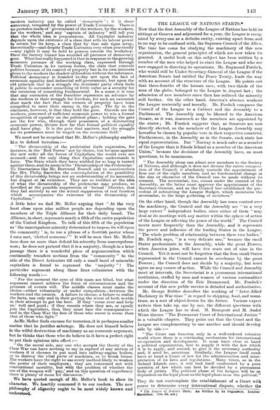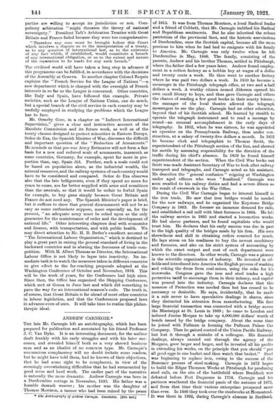THE LEAGUE OF NATIONS STARTS.* Now that the first Assembly
of the League of Nations has held its sittings at Geneva and adjourned for a year, the League is recog- nized by every one as a definite entity, existing apart from, and in no way to be confused with, the Supreme Council of the Allies. The time has come for studying the machinery of this new organization, the general principles of which are now taken for granted. A useful book on this subject has been written by a number of the men who helped to start the League and who are now engaged in directing its operations. Mr. Raymond Fosdick, who would still be Under-Secretary-General of the League if the American Senate had ratified the Peace Treaty, leads the way with an account of the structure of the League. He points out that three-fourths of the human race, with two-thirds of the area of the globe, belonged to the League in August last ; the admission of new members since then has reduced the minority still further. On the other hand, America's absence weakens the League materially and inorally. Mr. Fosdick compares the Council of the League to a Cabinet and the Assembly to a
Parliament. The Assembly may be likened to the American Senate, as it was, inasmuch as the members are appointed by
the states ; Mr. Fosdick suggests that, as Senators are now directly elected, so the members of the League Assembly may hereafter be chosen by popular vote in their respective countries. Furthermore, in the Assembly as in the Senate, each state has equal representation. But " Norway is much safer as a member of the League than is Rhode Island as a member of the American Union," because the decisions of the Assembly have, on most questions, to be unanimous.
" The Assembly alone can admit new members to the Society of Nations, and although it does not dictate the entire composi- tion of the Council, it absolutely controls the appointment of four out of the eight members, and no fundamental change in the size or character of the Council can be made without its consent. The secretariat, too, comes under the control of the Assembly, as the latter must approve the appointment of the Secretary-General, and as the Council has established the pre- cedent of submitting the League Budget, which maintains the secretariat, to the large gathering of members."
On the other hand, though the Assembly has some control over the machinery, the Council and the Assembly are " to a very large extent " independent bodies, since either of them " may deal at its meetings with any matter within the sphere of action of the League or affecting the peace of the world." The Council meets more frequently than the Assembly, and it represents the power and influence of the leading States in the League.
" The whole problem of relationship between these two bodies," Mr. Fosdick says, " ie a very delicate one," because the small States predominate in the Assembly, while the great Powers, when America joins, will have five seats out of nine in the Council. Yet it must not be forgotten that the four small States represented in the Council cannot be overborne by the great Powers ; the Council does not decide by a majority, but must agree on any course of action. While the Council and Assembly meet at intervals, the Secretariat is a permanent international institution, staffed by men and women of various nationalities under the direction of Sir Eric Drummond. Mr. Fosdick's account of this new public service is detailed and authoritative.
Mr. George Rublee describes the working of " Inter-Allied Machinery in War-time " in regard to shipping, food, and muni- tions, as a sort of object-lesson for the future. Various expert writers then take up, one by one, the different questions with which the League has to deal. M. Bourgeois and M. Andre Weiss discuss " The Permanent Court of International Justice " in a valuable chapter. They point out that the Court and the League are complementary to one another and should develop side by side :— " The Court can function only in a well-ordered cohesive world where there is a continuing mechanism for international co-operation and development. It must have close at hand a political organization, first to supply it with the law which it is to apply, and second, to give it the necessary authority and, if need be, sanctions. Similarly, the League itself must have at hand a Court of law for the administration and inter- pretation of its laws and regulations. Many times, as in the Aaland Islands case, it will find itself confronted by a pure question of law which can best be decided by a permanent body of jurists. The political phase of the League will be as dependent on the legal phase as the legal phase is on the political."
They do not contemplate the establishment of a Court with power to determine every international dispute, whether the
• The League of Nations Starts. AD Outline by its organisers. London: maciaillas. ties. ed. net.]
- - parties are willing to accept its jurisdiction or not. Com- pulsory arbitration " might threaten the theory of national sovereignty." President Taft's Arbitration Treaties with Great Britain and France failed because they were too comprehensive.
" Therefore any case must be brought before this Court which involves a dispute as to the interpretation of a treaty, as to any question of international law, as to the existence of any fact which, if established, would constitute a breach of any international obligation, or as to the extent and nature of the reparation to be made for any such breach."
The civilized world will have taken a long step in advance if this programme can be fulfilled, in accordance with the decisions of the Assembly at Geneva. In another chapter Colonel Requin explains the " French Service for the League of Nations "—a new department which is charged with the oversight of French interests in so far as the League is concerned. Other countries, like Italy and Spain, have followed this example. Private societies, such as the League of Nations Union, can do much, but a special branch of the civil service in each country may be usefully employed in studying the problems which the League has to face.
Mr. Ormsby Gore, in a chapter on " Indirect International Supervision," gives a clear and instructive account of the Mandate Commission and its future work, as well as of the treaty clauses designed to protect minorities in Eastern Europe. Sefior do Eza, the Spanish Minister of War, discusses the difficult and important question of the " Reduction of Armaments."
He reminds us that pro-war Army Estimates will not form a fair basis for a new and reduced scale of armaments, inasmuch as some countries, Germany, for example, spent far more in pro- portion than, say, Spain did. Further, such a scale could not be based on population alone, as the industrial wealth, the mineral resources, and the railway systems of each country would have to be considered and compared. Sefior do Eza observes also that the late belligerents, even if they spend no more for years to come, are far better supplied with arms and munitions than the neutrals, so that it would be unfair to forbid Spain for example, to buy guns simply because Great Britain and
France do not need any. The Spanish Minister's paper is brief, but it suffices to show that general disarmament will not be so easy as some enthusiasts suppose, more especially as, for the present, " an adequate army must be relied upon as the only
guarantee for the maintenance of order and the development of national life." Other interesting chapters deal with economics and finance, with transportation, and with public health. We may direct attention to Mr. H. B. Butler's excellent account of " The International Labour Organisation," which is destined to play a great part in raising the general standard of living in the backward countries and in abating the fierceness of trade com- petition. With M. Albert Thomas as Director, the International Labour Office is not likely to lapse into inactivity. Its im- mediate task is to watch the measures taken in different countries to give effect to the far-reaching proposals adopted at the
Washington Conference, of October and November, 1919. This will be the work of years, for the Conference had high aims. Since then, the Office has organized the Shipping Conference,
which met at Genoa in June last and which did something to pave the way for an international seamen's code. The truth is, of course, that Great Britain is far ahead of most other countries in labour legislation, and that the Conferences proposed laws in advance even of ours. It will take time to realize this philan- thropic ideal.



































 Previous page
Previous page